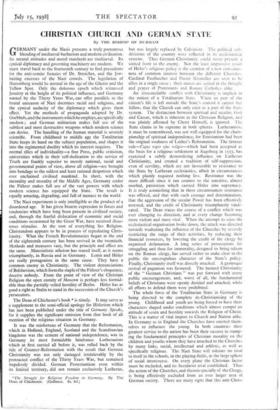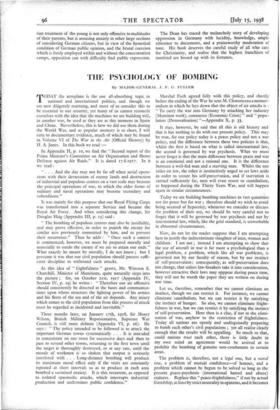CHRISTIAN CHURCH AND GERMAN STATE
By THE BISHOP OF DURHAM
GERMANY under the Nazis presents a truly portentous blending of mediaeval barbarism and modem civilisation. Its mental attitudes and moral standards are mediaeval. Its cynical diplomacy and governing machinery are modern. We must travel back to the fourteenth century to find precedents for the anti-semite frenzies of Dr. Streicher, and the Jew- baiting excesses of the Nazi crowds. The legislation of Nuremberg would be normal in the age of the Ghetto and the Yellow Spot. Only the dolorous epoch which witnessed Jesuitry at the height of its political influence, and Germany wasted by the Thirty Years War, can offer parallels to the brutal unreason of Nazi doctrines racial and religious, and the cynical audacity of the diplomacy which gives them effect. Yet the methods of propaganda adopted by Dr. Goebbels, and the instruments which he employs, are specifically modern ; and German militarism makes full use of the subtlest and most destructive weapons which modern science can devise. The handling of the human material is severely scientific. From childhood to middle age the Totalitarian State keeps its hand on the subject population, and shapes it into the regimented docility which its interest requires. The normal allies of individuality—a free Press, public criticism, universities which in their self-dedication to the service of Truth are frankly superior to merely national, racial and governmental points of view, above all religion—are brought into bondage to the oddest and least rational despotism which ever enchained civilised mankind. In short, with the mentality and morality of the Middle Ages, Germany under the Fiihrer makes full use of the vast powers with which modern science has equipped the State. The result is equally amazing, degrading, and full of menace to the world.
The Nazi experiment is only intelligible as the product of a disordered age. It has given bizarre expression to forces and tendencies which have long been present in civilised society, and, through the fearful dislocation of economic and social conditions occasioned by the Great War, have received disas- trous stimulus. At the root of everything lies Religion. Christendom appears to be in process of repudiating Chris- tianity. What the French Revolutionaries began at the end of the eighteenth century has been revived in the twentieth. Methods and measures vary, but the principle and effect are the same. Materialistic atheism has reared itself; as it seems triumphantly, in Russia and in Germany. Lenin and Hitler are really protagonists in the same cause. They have a common enemy in Christianity. The violent denunciations of Bolshevism, which form the staple of the Fares eloquence, deceive nobody. From the point of view of the Christian Religion the open enmity of Moscow is perhaps less formid- able than the partially veiled hostility of Berlin. Hitler has as good a right as Stalin to stand in the succession of the Church's persecutors.
The Dean of Chichester's book * is timely. It may serve as a supplement to the semi-official apology for Hitlerism which has just been published under the title of Germany Speaks, for it supplies the significant omission from that book of all mention of the religious situation in Germany.
It was the misfortune of Germany that the Reformation, which in Holland, England, Scotland and the Scandinavian kingdoms was the cement of national independence, was in Germany its most formidable hindrance. Lutheranism which at- first carried all before it, was rolled back by the tide of Counter-Reformation with the result that German Christianity was not only damaged irretrievably by the protracted conflict of the Thirty Years War, but remained hopelessly divided. German Protestantism even within its limited territory, did not remain exclusively Lutheran, *The Straggle for Religious Freedom in Germany. By The Dean of Chichester. (Gollancz. 8s. 6d.) but was largely replaced by Calvinism. The political sub- divisions of the country were reflected in its ecclesiastical systems. Thus German Christianity could never present a united front to the enemy. Not the least impressive result of Hitler's religious policy is the creation of a new conscious- ness of common interest between the different Churches. Cardinal Faulhauber and Pastor Niemoller are seen to be allies in a single cause ; their names are united in the thought and prayer of Protestants and Roman Catholics alike.
An irreconcilable conflict with Christianity is implicit in the notion of a Totalitarian State. When no part of the citizen's life is left outside the State's control it cannot but follow, that the Church can only exist as a part of the State system. The distinction between spiritual and secular, God and Caesar, which is inherent in the Christian Religion, and was plainly affirmed by Christ Himself, is ignored. The State claims to be supreme in both spheres. Lutheranism, it must be remembered, was not well equipped for the cham- pionship of spiritual independence, for Erastianism had been the original weakness of Luther's Reformation. The famous rule—Cujus regio ejus religio—which had been accepted as the basis for a religious settlement at Augsburg in 1555, has exercised a subtly demoralising influence on Lutheran Christianity, and created a tradition of self-suppression, even of servility, which are not favourable to resistance to the State by Lutheran ecclesiastics, albeit in circumstances which plainly required nothing less. Resistance was the more difficult since it ran counter to the sensitive, almost morbid, patriotism which carried Hitler into supremacy. It is truly astonishing that in these circumstances resistance was offered, and that with such courage and determination, that the aggression of the secular Power has been effectively arrested, and the credit of Christianity triumphantly vindi- cated. The Dean traces the course of a conflict which was ever changing its direction, and at every change becoming more violent and more vital. When the attempt to seize the ecclesiastical organisation broke down, the attack was directed towards weakening the influence of the Churches by severely restricting the range of their activities, by reducing their financial resources, by lowering the credit of the clergy by organised defamation. A long series of prosecutions for smuggling and then for immorality, designed to bring odium on the Roman clergy, has served rather to make clear to the public the unscrupulous character of the State's policy. Finally, Christianity itself was directly attacked. A grotesque revival of paganism was favoured. The bastard Christianity of the " German Christians " was put forward with every public encouragement, and, worst of all, the fundamental beliefs of Christians were openly derided and attacked, while all efforts to defend them were prohibited.
The whole force of the Totalitarian State in Germany is being directed to the complete de-Christianising of the young. Childhood and youth are being forced to have their characters shaped under conditions which almost compel an attitude of scorn and hostility towards the Religion of Christ. This is a matter of vital import to Church and Nation alike. In Germany as in England the Churches have exerted them- selves to influence the young. In both countries their greatest service to the nation has been their success in stamp- ing the fundamental principles of Christian morality on the children and youths whom they have attached to the Churches by many links, social, intellectual and athletic, as well as specifically religious. The Nazi State will tolerate no rival to itself in the schools, in the playing-fields, in the large sphere of social intercourse. On every plane the Christian factor must be excluded, and its Secularist rival established. Thus the action of the Churches, and therein specially of the Clergy, is being effectively excluded from an ever larger area of German society. There are many signs that this anti-Chris- tian treatment of the young is not only offensive to multitudes of their parents, but is arousing anxiety in other large sections of considering German citizens, but in view of the hysterical condition of German public opinion, and the brutal coercion which is freely employed within and without the concentration camps, opposition can with difficulty find public expression. The Dean has traced the melancholy story of developing oppression in Germany with lucidity, knowledge, ample reference to documents, and a praiseworthy moderation of tone. His book deserves the careful. study of all who care for Christianity, and realise that the highest franchises of mankind are bound up with its fortunes.











































 Previous page
Previous page